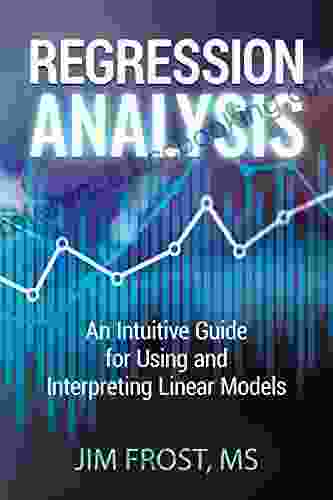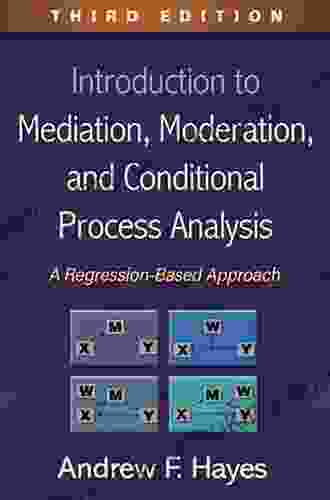Revolutionize Your Research: Unleash the Power of Regression-Based Approach Methodology in Social Sciences

In the ever-evolving landscape of social sciences, the need for robust and sophisticated research methodologies has become paramount. Regression-based approach methodology stands out as a cornerstone of this methodological arsenal, offering researchers an unparalleled ability to explore complex relationships and draw meaningful inferences from their data.
What is Regression-Based Approach Methodology?
Regression-based approach methodology is a statistical technique that allows researchers to determine the relationship between a dependent variable and one or more independent variables. It involves creating a mathematical model that predicts the value of the dependent variable based on the values of the independent variables.
4.3 out of 5
| Language | : | English |
| File size | : | 11015 KB |
| Screen Reader | : | Supported |
| Print length | : | 732 pages |
Regression models can be either linear or nonlinear, depending on the nature of the relationship between the variables. Linear regression models assume a straight-line relationship, while nonlinear models allow for more complex relationships.
Benefits of Using Regression-Based Approach Methodology
Regression-based approach methodology offers numerous benefits for social science researchers, including:
* Identification of Relationships: It helps researchers identify the relationships between variables and determine which variables are most influential. * Prediction and Forecasting: Regression models can be used to predict the value of the dependent variable based on the values of the independent variables, allowing researchers to make forecasts and projections. * Hypothesis Testing: Researchers can use regression models to test hypotheses about the relationships between variables and assess the statistical significance of these relationships. * Control for Confounding Variables: Regression models allow researchers to control for the effects of confounding variables, which can bias the results of their analysis. * Variety of Applications: Regression-based approach methodology has a wide range of applications in social sciences, including research on social behavior, economic trends, and political outcomes.
Types of Regression Models
There are numerous types of regression models available to researchers, each with its own specific purpose and assumptions. Common types include:
* Multiple Linear Regression: Used to predict a continuous dependent variable based on multiple independent variables that are assumed to have a linear relationship. * Logistic Regression: Used to predict a categorical dependent variable based on multiple independent variables that can be either continuous or categorical. * Poisson Regression: Used to predict count data, assuming that the number of events follows a Poisson distribution. * Time Series Regression: Used to analyze data collected over time, accounting for autocorrelation and other time-related effects.
Choosing the Right Regression Model
The choice of regression model depends on the nature of the research question, the type of data available, and the assumptions that can be made about the relationships between the variables. Researchers should carefully consider these factors when selecting the most appropriate model for their analysis.
Interpreting Regression Results
Once a regression model has been fitted to the data, it is important to interpret the results carefully. Researchers should pay attention to the following:
* Significance of Regression Coefficients: The significance of each regression coefficient indicates whether the corresponding independent variable has a statistically significant effect on the dependent variable. * Goodness-of-Fit: The goodness-of-fit measures assess how well the regression model fits the data and accounts for the variation in the dependent variable. * Residual Analysis: Residual analysis can reveal patterns in the residuals, which may indicate potential problems with the regression model or the assumptions that were made.
Applying Regression-Based Approach Methodology
Applying regression-based approach methodology involves several steps:
* Data Collection: Researchers must collect high-quality data that are relevant to the research question and meet the assumptions of the regression model. * Data Preparation: The data should be cleaned, transformed, and prepared for analysis using appropriate statistical software. * Model Selection: Researchers must select the most appropriate regression model based on the nature of their research question and the available data. * Model Fitting: The regression model is fitted to the data using statistical software, which estimates the regression coefficients and other model parameters. * Model Interpretation: The fitted regression model is interpreted to draw inferences about the relationships between the variables and assess the validity of the hypotheses. * Model Validation: Researchers should validate the regression model using cross-validation or other techniques to ensure its reliability and generalizability.
Regression-based approach methodology is an essential tool for researchers in the social sciences. It provides a powerful framework for exploring complex relationships, testing hypotheses, and making predictions. By applying regression-based approach methodology with rigor and care, researchers can gain valuable insights into the social world and contribute to a deeper understanding of human behavior and society.
4.3 out of 5
| Language | : | English |
| File size | : | 11015 KB |
| Screen Reader | : | Supported |
| Print length | : | 732 pages |
Do you want to contribute by writing guest posts on this blog?
Please contact us and send us a resume of previous articles that you have written.
 Book
Book Novel
Novel Page
Page Chapter
Chapter Text
Text Story
Story Genre
Genre Reader
Reader Library
Library Paperback
Paperback E-book
E-book Magazine
Magazine Newspaper
Newspaper Paragraph
Paragraph Sentence
Sentence Bookmark
Bookmark Shelf
Shelf Glossary
Glossary Bibliography
Bibliography Foreword
Foreword Preface
Preface Synopsis
Synopsis Annotation
Annotation Footnote
Footnote Manuscript
Manuscript Scroll
Scroll Codex
Codex Tome
Tome Bestseller
Bestseller Classics
Classics Library card
Library card Narrative
Narrative Biography
Biography Autobiography
Autobiography Memoir
Memoir Reference
Reference Encyclopedia
Encyclopedia Allen Giese
Allen Giese Allen Manning
Allen Manning Andrew A Kling
Andrew A Kling Allen Richardson
Allen Richardson Alia Malek
Alia Malek Alicia Hall
Alicia Hall Andy Rathbone
Andy Rathbone Alexandra Garbarini
Alexandra Garbarini Angela Lovell
Angela Lovell Amira Hass
Amira Hass Andy Schneider
Andy Schneider Amy Poehler
Amy Poehler Angela Grassi
Angela Grassi Amelia Simmons
Amelia Simmons Amy S F Lutz
Amy S F Lutz Andy Kessler
Andy Kessler Andrej Spec
Andrej Spec Alison Heiser
Alison Heiser Angie Papple Johnston
Angie Papple Johnston Andre Campbell
Andre Campbell
Light bulbAdvertise smarter! Our strategic ad space ensures maximum exposure. Reserve your spot today!
 Yukio MishimaFollow ·11.3k
Yukio MishimaFollow ·11.3k Alfred RossFollow ·18.2k
Alfred RossFollow ·18.2k Eli BlairFollow ·16k
Eli BlairFollow ·16k Jessie CoxFollow ·10.1k
Jessie CoxFollow ·10.1k Jeremy CookFollow ·7k
Jeremy CookFollow ·7k Mario BenedettiFollow ·2.3k
Mario BenedettiFollow ·2.3k Ruben CoxFollow ·18.1k
Ruben CoxFollow ·18.1k Mario SimmonsFollow ·16k
Mario SimmonsFollow ·16k

 Julio Cortázar
Julio CortázarIf You Don't Do Politics, Politics Will Do You
Uncover the Hidden Power in Everyday Life In...

 Ivan Turner
Ivan TurnerThe Edge of Physics: Unraveling the Extraordinary...
What is the nature of...

 Diego Blair
Diego BlairAn Intuitive Guide For Using And Interpreting Linear...
Linear models...

 Oscar Wilde
Oscar WildeThrough Two Doors At Once: Unveiling the Enigmatic World...
Prepare to delve into the captivating realm of...

 Darrell Powell
Darrell PowellWomen Athletes in History: An Inspiring Gift for Teenage...
Unveiling the Extraordinary Stories of Female...
4.3 out of 5
| Language | : | English |
| File size | : | 11015 KB |
| Screen Reader | : | Supported |
| Print length | : | 732 pages |














